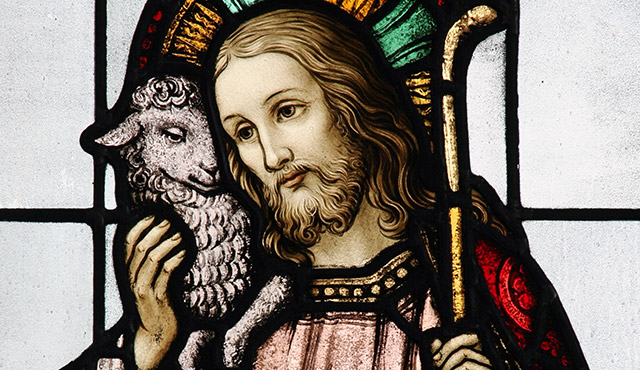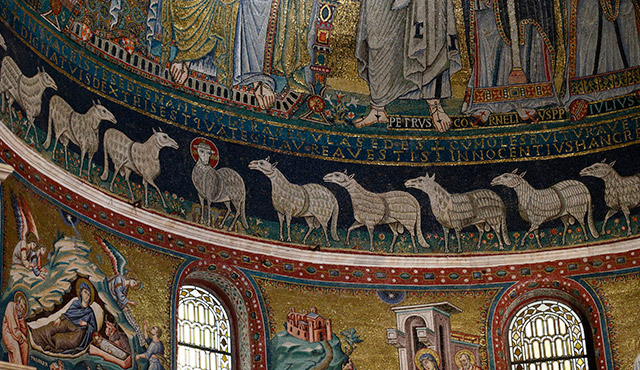It is a frequently read, quoted, illustrated and sung biblical verse, and nearly everyone in Judeo-Christian society – from the most reverent churchgoer to the most jaded secularist – is familiar with it:
The Lord is my shepherd; I shall not want.
He maketh me to lie down in green pastures: He leadeth me beside the still waters …
It’s no accident that the 23rd Psalm evokes the image of God as a shepherd. Jesus applied this image to Himself, emphasizing that, “The good shepherd lays down his life for the sheep.”
The Catechism of the Catholic Church asserts that, “The Church is … a ‘sheepfold,’ the sole and necessary gateway to which is Christ. It is also the flock of which God himself foretold that he would be the shepherd, and whose sheep, even though governed by human shepherds, are unfailingly nourished and led by Christ himself.”
Christian clergy and other leaders have for centuries been called to shepherd their followers – to lead them, feed them and love them.
Although the shepherd, the sheep and the flock are mentioned hundreds of times in The Holy Bible, this metaphor is not limited to Christianity. According to the ancient Sumerians, Dumzid, also called “the Shepherd,” ruled for 36,000 years. The ancient Greek gods were called upon to protect sheep. Abraham, Isaac, Jacob, Moses and King David were all shepherds. In Chinese Buddhist lore, a ram was present at the birth of Siddhartha Gautama, more commonly known as the Buddha. And in Madagascar, sheep are believed to be the incarnations of human souls.
All of this begs the question: Why the shepherd?
“In both the Hebrew and Christian scriptures, the image of the shepherd plays a pivotal role,” says Rev. Msgr. Arthur Holquin, episcopal vicar for Divine Worship of the Diocese and pastor emeritus of Mission Basilica, in San Juan Capistrano. “The historical context out of which much of this imagery emerges is agrarian. Hence, the image of the shepherd and sheep were readily recognizable for the people of biblical times.”
Because scripture is “the word of God in human words,” Msgr. Holquin notes, the human authors looked for images to help carry the truth of God’s care for His people, similar to the care that a shepherd provides for his flock.
Since we live in a culture that stresses the importance of independence, we may be reluctant to admit that the Bible’s view of sheep serves as an apt metaphor for humans. Without someone tending the flock, sheep wander about, need to be led to pasture and require protection from predators.
To skeptics and nonbelievers, the image of vapid, bleating sheep being herded about by shepherds brings to mind flocks of people who rely on religion because they cannot exercise free will and think for themselves. After all, the skeptics say, sheep blindly follow the status quo, naturally fear change and never embrace challenge.
Msgr. Holquin takes a more complex view.
“Many Christians today do not have the slightest understanding of living within an agrarian culture,” he says. “Hence, the imagery of ‘flock’ and ‘sheep’ need to be nuanced; they are figures of speech and not to be taken literally. [Human beings are] endowed by our creator with free will and the ability of self-determination. … God has called each one of us to use the gifts of our intellectual capacity to build up the Body of Christ for the glory of God.”
The shepherd metaphor is in direct contrast to the stereotypical image of secular leaders, particularly selfish, narcissistic rulers. They live in lavish homes, are sheltered from hardship and poverty, and are out of touch with their followers. Shepherds, conversely, slept near the sheep pen, endured threatening wild animals and the harsh elements, and protected their flock at all times.
This contrast is clearly what Pope Francis had in mind when, during Chrism Mass in St. Peter’s Basilica in March 2013, he called on the world’s priests to stay close to the marginalized and be “shepherds living with the smell of the sheep.” Those “who don’t go out of themselves” by being mediators between God and people can “gradually become intermediaries, managers …”
Although he was speaking of priests, “I think he’s getting at the heart of vocation, whether lay, religious or cleric,” says Pia de Solenni, associate dean and professor of moral theology at the Augustine Institute. “Vocation is the way that God has called each one of us to love Him, serve Him and witness His profound and passionate love to others. We can’t do that when we protect ourselves with boundaries that do not allow us to encounter those we serve.
“As shepherds, our priests have been given sheep that are infinitely more valuable in the eyes of God. [They] are called to move beyond the comfort zone and truly encounter people in their need.”
“For me,” Msgr. Holquin says, “that quote powerfully conveys the notion that bishops, priests and deacons should never forget that we are cut from the same bolt of fabric as the rest of humanity. Our effectiveness as shepherd-leaders is in direct proportion to our ability to share our peoples’ joys and sorrows, to help carry their burdens and companion them in their journeys through the dark valleys of life. To paraphrase St. Augustine: For you, I am a priest; with you, I am a Christian.”


